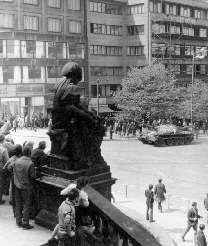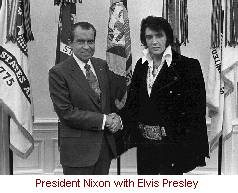|
|
|
China accuses Soviet leaders of imperialism after the Soviet-led invasion of Czechoslovakia. This worsens the Sino-Soviet tension.
The Prague Spring, a movement led by Alexander Dubcek of the Czechoslovak Communist Party, calls for radical changes in the government and the creation of "socialism with a human face". The party attempts to liberalise and democratise Czechoslovakian life by granting freedom of speech and press. The movement is seen favourably by the West, but not by the Soviet Union.

Venceslaus Square during the Prague Spring incident.
Read more about the Prague Spring incident in this article written by the Prague Post Online.
President Arif is overthrown and Major General Ahmed Hassan al-Bakr is appointed head of the new government in Iraq. He continues to maintain general hostility towards the West and friendship with the Soviet Union.
The Treaty on the Non-Proliferation of Nuclear Weapons is signed by Great Britain, the United States and the Soviet Union. They agree that they will not assist or encourage other nations to develop their own nuclear devices. The treaty goes into effect in 1970.
The text of the treaty
A combined force of Soviet, East German, Polish, Hungarian and Bulgarian troops invade Czechoslovakia in an attempt to end the Prague Spring movement. A treaty is signed to allow Soviet troops to remain in the country for the next 20 years.
 Richard Nixon
is elected president of the United States.
Richard Nixon
is elected president of the United States.
|





 Richard Nixon
is elected president of the United States.
Richard Nixon
is elected president of the United States.